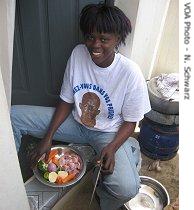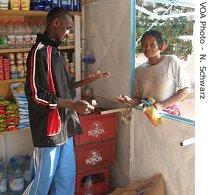2007年VOA标准英语-Senegal Low-Income Workers Open Bank Accounts
搜索关注在线英语听力室公众号:tingroom,领取免费英语资料大礼包。
(单词翻译)
By Naomi SchwarzDakar
19 May 2007
In the West African nation of Senegal, fewer than 10 per cent of people have accounts at traditional banks. Such accounts have traditionally been seen as only for the very rich. But a growing network of branches extending into more remote areas means that more people than before have access to banks. Naomi Schwarz visited on the outskirts1 of Dakar with a new mother who has a savings2 account.
 |
| Margot Seck |
Since she is not working now, she has been spending from her savings. But ever since the 25-year-old came to Dakar from her
family's village and began working, she has been putting aside a small portion of her paycheck for just such an occasion. "When I was paid my salary, I would spend what I needed, and I would bring the rest to the corner shopkeeper to hold on to for me," she says.
Two years ago, with the help of her boss, Seck opened an account at one of Senegal's commercial banks.
Seck's boss advanced to her and three co-workers the 150-dollar minimum deposit the bank required, and she helped them acquire the
necessary papers.
Seck goes to a small bedside cabinet and pulls out a simple wooden box with a lock.
She unlocks the box and takes out the papers, explaining that before she moved in with her husband, she shared a room with many single cousins, and the locked box was needed to keep her finances private.
She says she told only her brothers and sisters about the bank account, and just recently, her husband. "Ah, when you say that you have an account, people will think that you have a lot of money, even though it is nothing."
Seck says the bank takes money out of her account for various fees. "The first month, they took out 10 dollars. We were shocked, why did they take out this ten dollars. When we went to the bank, they told us it was for insurance," she says.
Seck says the bank also debits4 just over two dollars every three months for maintenance costs.
 |
| Some Senegalese save money at corner shops like this one |
Despite Seck's story, most Senegalese do not have bank accounts.
Oumar Diene, of the Senegalese non-governmental organization CRESP, says this may be changing. "We have the impression that these days, there is an accent on potential clients who, until now, have not been taken into account by the big banks," he says.
He says that banks are directing their marketing5 campaigns at university students, many of whom have little or no income. He also notes the increasing number of bank branches across the country.
But obstacles are still keeping many Senegalese from opening accounts.
Mohammed Wilson, a director at Senegal's CBAO bank, says one obstacle is a culture that prefers cash transactions. He says Senegalese are wary6 of entrusting7 their money to someone else, and they are unfamiliar8 with how banks work.
But even for those who are interested in bank accounts, the minimum deposit can seem overwhelming, especially for non-salaried workers whose income varies from week to week. Wilson says the minimum deposit is required for the banks to cover their operating costs. He says if more people had bank accounts, the banks would be able to reduce the minimum deposit and also the fees.
Since so many businesses rely on cash transactions, Wilson says his branches must be prepared for large cash withdrawals9. This would be less of a burden if more people had accounts, and money could change hands invisibly, through checks.
 收听单词发音
收听单词发音 




